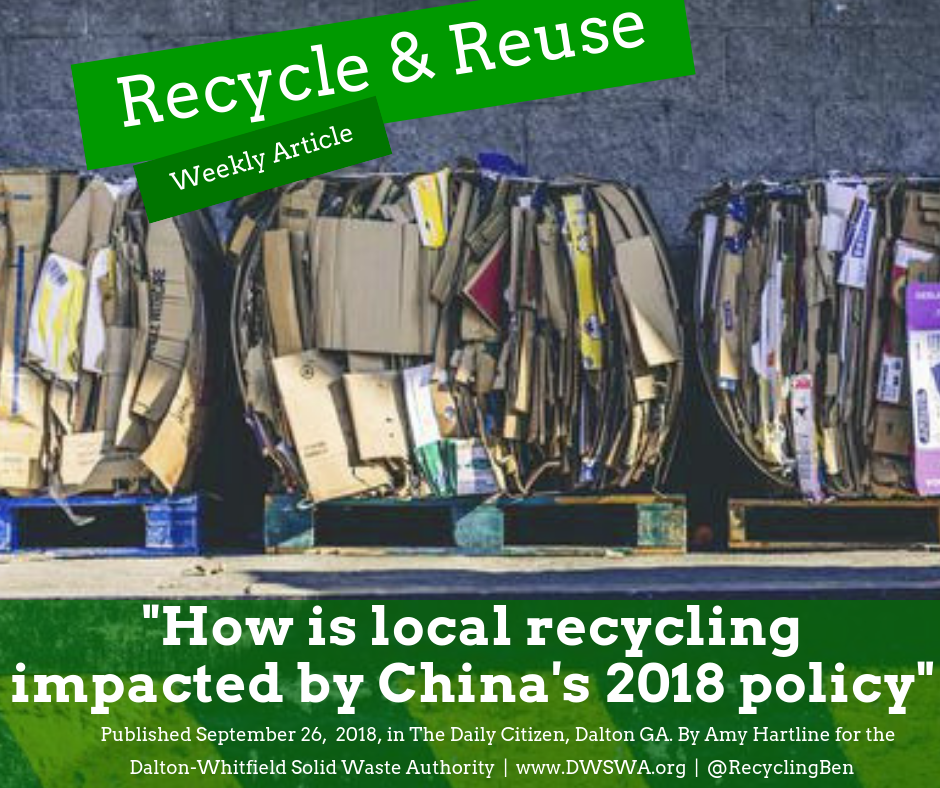How is Local Recycling Impacted by China's "National Sword" policy?
/You may have heard it through watching Fox News, reading the New York Times, or listening to NPR. They all have various headlines touting a “U.S. Recycling Crisis.” Through a recent action, China has begun turning away most of America’s recycled material due to high rates of contamination. In many regions of the US, businesses and municipalities are having to pay to have their material recycled. This has Whitfield County residents asking, “does my recycling actually end up in the landfill?”
There is a saying in the waste industry, “Trash is local,” and this saying has no exception when it comes to Whitfield County’s recycling. All of Whitfield and the City of Dalton’s recycling that is collected through convenience centers, “Target Recycling” bins, or curbside collection goes to the Dalton-Whitfield Solid Waste Authority’s Material Recovery Facility (MRF). All materials received are sorted, baled, and then sold to an end user of that product.
In 2017, China passed the National Sword policy banning plastic waste beginning in January 2018. So how is the MRF able to continue processing materials?
All of the recycling processed at the MRF goes into products that are made right here in Georgia. Georgia has the second largest infrastructure for end use recycled materials in the US. It also has one of the largest pulp/paper industries in the country as well. Fifteen mills use recycled paper and eight of those mills produce 100% recycled product. Dalton, known as the floor covering capital of the world, is able to use the PET from our recycled plastic bottles to create sustainable and environmentally friendly carpet.
For those of us in Whitfield County, we already know that recycling helps the environment. What often gets forgotten is its vital impact on a healthy state economy. While the U.S. exports about one-third of its recycling each year, the Authority’s MRF does not export any item and every bale stays in the same state it is recycled in, Georgia. This means that every paper, can, piece of cardboard, plastic and glass bottle you recycle here is wanted, needed, and has a market.
Many of the recycling programs in the US are struggling to find markets for their recycled materials because of contamination. Contamination is any material that ends up in the recycling stream that can’t be recycled such as food waste, sweaters, metal hangers, frozen food packaging, and other random “wish-cycled” items. The process of single-stream recycling has allowed programs to process recycling faster, but at the cost of significant contamination. This caused enough environmental issues for China that they are no longer willing to accept the responsibility of sorting these out. At the MRF in Dalton, recyclables come in source separated by bins or city curbside drivers and are then sorted through again by hand. This has led to a low contamination rate in our final product and a good reputation with end use consumers.
Coca-Cola, with its headquarters in nearby Atlanta, wants to have all of their bottles made with 50% recycled content by 2030, but to do this the materials have to be available. With the help of citizens from Whitfield County and the City of Dalton, multiple users in Georgia can have the material needed through recycling regularly and correctly.
For more information on how the MRF operates follow @RecyclingBen on Facebook, Instagram, or Snapchat, visit us at DWSWA.org, or call (706)-278-5001 and schedule a tour with an interested group. It is important that all citizens are able to recycle with confidence and you deserve to know what happens to your recycling. You can continue to trust us with your recyclables.
































